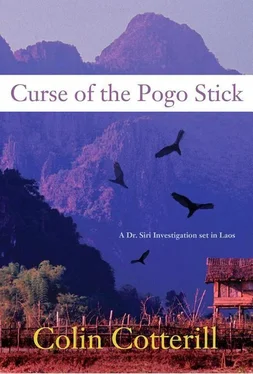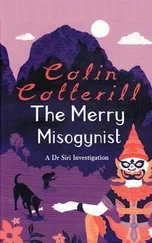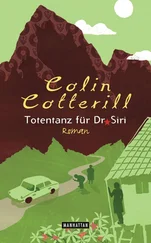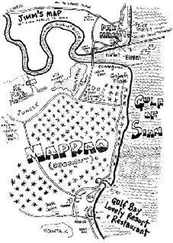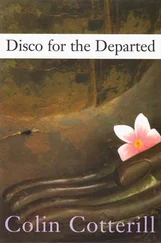Colin Cotterill - Curse of the Pogo Stick
Здесь есть возможность читать онлайн «Colin Cotterill - Curse of the Pogo Stick» весь текст электронной книги совершенно бесплатно (целиком полную версию без сокращений). В некоторых случаях можно слушать аудио, скачать через торрент в формате fb2 и присутствует краткое содержание. Жанр: Криминальный детектив, на английском языке. Описание произведения, (предисловие) а так же отзывы посетителей доступны на портале библиотеки ЛибКат.
- Название:Curse of the Pogo Stick
- Автор:
- Жанр:
- Год:неизвестен
- ISBN:нет данных
- Рейтинг книги:5 / 5. Голосов: 1
-
Избранное:Добавить в избранное
- Отзывы:
-
Ваша оценка:
- 100
- 1
- 2
- 3
- 4
- 5
Curse of the Pogo Stick: краткое содержание, описание и аннотация
Предлагаем к чтению аннотацию, описание, краткое содержание или предисловие (зависит от того, что написал сам автор книги «Curse of the Pogo Stick»). Если вы не нашли необходимую информацию о книге — напишите в комментариях, мы постараемся отыскать её.
Curse of the Pogo Stick — читать онлайн бесплатно полную книгу (весь текст) целиком
Ниже представлен текст книги, разбитый по страницам. Система сохранения места последней прочитанной страницы, позволяет с удобством читать онлайн бесплатно книгу «Curse of the Pogo Stick», без необходимости каждый раз заново искать на чём Вы остановились. Поставьте закладку, и сможете в любой момент перейти на страницу, на которой закончили чтение.
Интервал:
Закладка:
The Hmong had first migrated to Laos from China almost two centuries before. They were a people forced through their swidden-slash and burn farming-lifestyle to move on every five to ten years when the fields became unproductive. Originally, land had been plentiful and this was no problem. But soon, with overcrowding on the plains, they were forced to higher and higher ground. They were a race with no nation, no large cities, and few ambitions beyond family and home. They lived according to tradition with the elders teaching everything technical, moral, and spiritual to the young. But history constantly found them in the wrong place at the wrong time. Opium cultivation had been imposed on them by the Chinese and French administrators, then they were taxed for producing it. When they supplied to the wrong side, they were hounded off the land. They found themselves in a system they’d had no desire to enter, constantly having to fight for their independence. When they fought it was not out of conviction but for their own survival.
In Laos, interclan rivalry was exploited at the time of the Japanese occupation. One clan collaborated with the Japanese, the other with the French. This split became even more pronounced after the war, with one side forming an alliance with the communists in the north and the other with the Americans. There was very little option of nonalignment. The Lao Hmong lived in a land that had forever been somebody’s battleground. Diverse groups who had no interest in politics were forced by their clan name to favor one side or the other. Clans found themselves pulled into the fray by recruiters. Once again, the Hmong had become somebody’s enemy-a title their culture abhorred and, given their history of abuse, one they hardly deserved.
Once rallied, the Hmong were fierce fighters and all those who battled alongside or against them vouched for their valor. It wasn’t until 1973 that a cease-fire was called in the protracted civil war but the suffering hadn’t stopped for the hill tribes. In 1975, the so-called thirty-year Hmong who had sided with the Pathet Lao were somehow forgotten when the communists took control of the country. There were token positions and ranks allocated, but the majority were either sent back to grow opium, or, worse still, relocated to the plains, where they succumbed to diseases unknown in the mountains.
The Hmong who fought with the CIA under General Vang Pao were also forgotten by their allies. The Americans could retreat to the land of the free and the brave, but the Hmong had nowhere to go. They were the enemy in their own land. They weren’t extended the luxury of being ignored or relocated. They were hunted. They fled, of course, some to the camps in Thailand, other old soldiers to the mountains around Phu Bia, where they formed the armйe clandestine in a hopeless resistance against the PL. Others still formed bandit gangs and vented their frustration on their own kind. Once again, war had divided a culture, split families, and left only shells of the proud men and women who had fought and lived to tell the tale.
No, it wasn’t the Hmong Siri was afraid of. He’d been in battles all his life and survived. A bullet to the head wouldn’t have been that much of an upheaval to him now. What distressed him was the thought of being stuck in the jungle with spotty-faced Judge Haeng for a month. That, he decided, would be a slow and agonizing way to go.
There wasn’t a lot for individuals to do on a Sunday in Vientiane. At least from Monday to Saturday a person could work for next to no pay and spend her evenings doing community service for the sheer joy of it. But Daeng was officially a business proprietor and Dtui had recently moved to her new husband’s rooms at the police compound so neither was registered for the Sunday community development programs. This meant there wasn’t even a slim hope of clearing garbage from the banks of the irrigation ditch or laying gravel on a dirt road while singing “The Blood We Shed for the Republic Has Turned to Sweat.”
So, instead, they rode their bicycles to the little metal bridge at kilometer 2 that crossed over to Don Chan.
The river island was man-made, the Mekhong having been diverted into an aqueduct to supply water for the city long before the establishment of the Nam Ngum waterworks. In the rainy season nothing more than a humble stub poked from the water, but now the island and its sandbar stretched way back past the city. Small holders and farmers had rebuilt their bamboo huts and fresh green vegetables sprouted in abundance. It was the ideal spot for a picnic. Dtui and Daeng’s spread consisted of river-fish cakes, sapodilla-flavored rice wine, and of course, vegetables with still-beating hearts plucked from the earth before them. They sat at the top of an eight-foot-high bank, close enough to Thailand to see their affluent neighbors taking lunch, sitting at tables watching their poor Lao neighbors cross-legged on the grass getting pickled.
“Do you think they wish they were here?” Dtui asked. With the baby working on its personality inside her, she’d decided this would be her last drinking day. Even so she sipped modestly at the sweet wine. Daeng was a serious drinker and she more than made up for Dtui’s abstinence.
“Why not?” Daeng replied. “I’ve seen wild birds in the branches of trees looking enviously at caged song doves. We all of us want what we can’t have. Do you wish you were there?”
“I was there, briefly. I liked everything about it. It’s so modem. The stores have so much choice compared to ours. They’re crammed with all kinds of goodies. But… I don’t know, I wondered where it would end. You get a rice cooker and you lust for an oven. You get an oven and you want a chef to come and cook for you. Once you get into that cycle you can never be satisfied.”
“So, you prefer having nothing.”
“I appreciate things more. And I don’t have nothing. I have friends. I have a reasonably good life-a socially responsible job-experiences. I mean, how many people get to hang out with a legend of the underground movement?”
“Oh dear. You can’t believe everything Siri tells you, you know.”
“Yes I can. He’s told me all about you. He says what he believes. That’s why I respect him. I wish I had nerve enough to blurt out what I actually feel like he does.”
“That luxury comes with age. When you’re younger, you don’t always get away with saying what you believe, particularly in this type of system.”
“Did you think it would end up like this? When you were fighting the French? Did you think the alternative to colonialism would be so… so claustrophobic? Did you think we’d be looking over our shoulders all the time worrying we might be doing or saying something to offend the Party?”
“We’re in transition, Dtui. Things will get better. At least we Lao are in control of our own destiny now.”
“If you don’t count the Vietnamese ‘advisers.’’’
“We’ll shake them off. Have faith. The worst is behind us. We haven’t known real peace for my entire lifetime. Let’s sit back and enjoy it while we’ve got it. By the way, my glass is empty.”
“Yes, Your Highness.”
They lay back in the thick buffalo-forehead grass for a while and listened to the slow, soothing motion of the river trickling through the reeds.
“I’m starting to feel guilty,’ Dtui confessed.
“How so?”
“I feel like we should be off catching the bomber.”
“I’ve told you. Patience is a vital component of a successful investigation. Rushing into it without a plan is a waste of human resources.”
“The trip to the police station yesterday was a complete waste of human resources. What did the boy say? ‘And why should we share our findings with you two… ladies?’ Talk about insolence.”
Читать дальшеИнтервал:
Закладка:
Похожие книги на «Curse of the Pogo Stick»
Представляем Вашему вниманию похожие книги на «Curse of the Pogo Stick» списком для выбора. Мы отобрали схожую по названию и смыслу литературу в надежде предоставить читателям больше вариантов отыскать новые, интересные, ещё непрочитанные произведения.
Обсуждение, отзывы о книге «Curse of the Pogo Stick» и просто собственные мнения читателей. Оставьте ваши комментарии, напишите, что Вы думаете о произведении, его смысле или главных героях. Укажите что конкретно понравилось, а что нет, и почему Вы так считаете.
